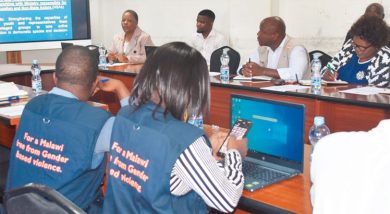MHRC helpless on prison conditions
Despite a landmark 2009 Constitutional Court ruling that ordered government to improve living conditions in prisons, nothing has moved and human rights bodies are helpless on how to push for implementation of the ruling.
The lawsuit that led to this ruling was filed by a prisoner, Gable Masangano, on behalf of all prisoners in the country, against Attorney General (AG), Minister of Home Affairs and Internal Security and Commissioner of Prisons.

Prison facilities in the country continue serving inmates a substandard and insufficient meal once in a day, contrary to expectations of human rights bodies that the minimum and acceptable requirement is nutritious meals to be given three times per day.
The State-funded Malawi Human Rights Commission (MHRC) has said its only option is to sue government for contempt of court on lack of movement on the 2009 ruling.
MHRC chairperson Justin Dzonzi said this to Nation on Sunday when asked why Malawi Prison Service (MPS) has continued to provide substandard meals while most prisoners walk around in rags, contrary to orders by the court.
He said his body has tried all it could to make authorities comply with the Gable Masangano ruling, but to no avail.
“The last option we have is to sue. But when we have to sue for contempt of court, there are other considerations to be made,” said Dzonzi.
He said when his commission engages prison officials, they are honest that the situation is as a result of lack of government commitment to providing adequate food and programmes to help the prisoners grow their own food and raise livestock.
Dzonzi said officials at the country’s major prisons Maula, Chichiri and Zomba have also complained of cooking pots, and that they use firewood, saying there was a need to modernise the kitchens if things were to improve.
Attorney General (AG), Charles Mhango, a few months ago, said in an interview that he needed time to check with his officers where the matter is.
“But I know about the Gable Masangano case and what it is required of government to do having done some human rights activism [before I became AG], but I need to check what is on the file,” he said.
The insufficient meal, which is nsima, but sometimes in a porridge-like form and served with beans or pigeon peas, is served around 2 and 3 in the afternoon for inmates that are deprived breakfast.
The meal is contrary to Prison Regulations, which indicate that the minimum standard of food to be served is 680g of maize or 454g of rice served with either 170g of cowpeas or beans or 113g of meat or fish and 21g of salt per individual per day, according to Victor Mhango, executive director of Centre for Human Rights Education Advice and Assistance (Chreaa).
Mhango said these are clear violations of the prisoners’ human rights which were highlighted in the case of Gable Masangano versus the AG and others.
Centre for Human Rights and Rehabilitation (CHRR) executive director Timothy Mtambo said in an interview on Friday that it is high time responsible bodies such as MHRC or other bodies sued government on violations of prisoners’ rights.





